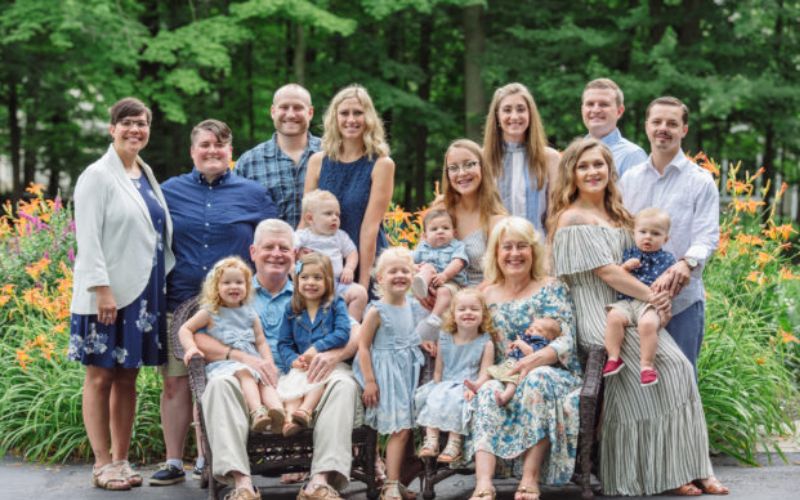IELTS Speaking About Family (gia đình) là một trong những chủ đề cơ bản và thường gặp nhất của bài thi IELTS Speaking. Edmicro sẽ giúp bạn tổng hợp bài mẫu cho cả 3 Part kèm bộ từ vựng đầy đủ nhất.
Speaking IELTS about family Part 1
Trong Speaking Part 1, giám khảo thường sẽ hỏi về chủ đề Family vì đây là topic dễ khai thác. Bạn sẽ thường được hỏi về các câu hỏi đơn giản như: “How many people are there in your family?” Cho đến câu hỏi về xu hướng chung trên toàn quốc: “Are people in your country generally close to their families?”
Cùng Edmicro tìm hiểu bộ câu hỏi và câu trả lời mẫu cho topic IELTS Speaking about Family.
- Do you have sisters and brothers? (siblings) If so, how many?
Yes, I have two siblings, one sister and one brother, making a total of three siblings.
- How often do you meet with your family?
I live alone in another city far from my family. However, I always try to see them on a regular basis, usually once a week, to spend quality time together.
- How do you spend time with your family?
We spend time together by having meals, watching movies, and taking family trips.
- Do you want to live with your family in the future?
Yes, I definitely want to live with my family in the future because their presence brings me comfort, support, and a sense of belonging.
- Are you close to all of your family members?
I have a close relationship with all of my family members. We share a strong bond and are there for each other in times of need.
- How has your family influenced you?
My family has shaped my values, beliefs, and character. They have taught me the importance of love, compassion, and perseverance, which have influenced my outlook on life.
- Do you get along well with your family?
Yes, I get along very well with my family. We have a harmonious relationship based on mutual respect, understanding, and support for one another.
- In what way is your family important to you?
My family is important to me in countless ways. They provide emotional support, encouragement, and a sense of belonging that gives me strength and stability in life.
- Which member of your family are you closest to?
I am closest to my sister. We have a special connection and share a deep understanding of each other’s thoughts and feelings.
- When did you last have a family party?
We had a family party during the last festive season, where all relatives gathered to celebrate and enjoy each other’s company.
- What is your special moment with your family?
One special moment with my family was when we embarked on a memorable vacation together, exploring new places and creating cherished memories that will last a lifetime.

- Are people in your country generally close to their families?
Yes, in my country, family plays a vital role, and people generally prioritize and maintain close relationships with their family members. Family ties are highly valued and cherished in our culture.
Speaking about family in IELTS Part 2
Trong Part 2 Speaking, bạn sẽ được giám khảo đưa một tờ Cue Card. Trên đó là đề bài Speaking và các gợi ý liên quan. Đây là ví dụ một số đề bài cho bài thi Speaking about family trong IELTS Part 2:
Đề 1: Describe someone in your family who you really admire.
Cue card
You should say:
- What relation this person is to you
- What are your first memories of this person
- How often you see this person
and explain why you really admire this person.
Bài mẫu
The person in my family whom I really admire is my father. He has been a constant source of inspiration and support in my life. My earliest memories of him go back to my childhood, where he would spend quality time with me, teaching me valuable life lessons and engaging in fun activities together.
I see my father almost every day. We have breakfast and dinner together, and he always makes an effort to be present in my life despite his busy schedule.
I truly admire my father. He is an incredibly hardworking individual who has achieved success through his dedication and perseverance. He has always been a role model for me in terms of his work ethic and determination to provide for our family.
In conclusion, my father, who is my role model and a constant source of support, is someone I truly admire. His hard work, kindness, and wisdom have had a profound impact on my life, and I am grateful to have him as a guiding force in my journey.
Đề 2: Describe a family member that you go on well with.
Cue card
You should say:
- Who they are?
- What relationship you have with that person
- What that person is like
- What you do together
also explain why you get on so well.
Bài mẫu
The family member I get along well with is my younger sister. We share a close sibling relationship and have always been each other’s confidants and best friends.
My sister is a warm-hearted and cheerful person with a great sense of humor.
We often engage in various activities together, such as watching movies, going shopping, and taking trips to explore new places.
We share similar interests and hobbies, which makes our time together enjoyable and fulfilling. Moreover, our open communication allows us to express our thoughts and feelings without judgment, fostering a deeper connection.
We get along so well because we have a strong bond built on trust, understanding, and unconditional love. We support and encourage each other in pursuing our dreams and overcoming challenges.
Đề 3: Describe something useful you learned from a member of your family.

Cue card
You should say:
- What you learned.
- How this became useful later in your life
- Have you taught it to someone
and explain why it was important for you.
Đề mẫu
Something useful I learned from my mother is the value of empathy and kindness towards others. She taught me to always treat people with respect, compassion, and understanding.
This lesson has become incredibly useful in my life, as it has helped me build strong relationships, navigate conflicts, and positively impact those around me.
I have shared this important lesson with my friends, colleagues, and even strangers, by demonstrating empathy and kindness in my interactions with them. I believe that spreading these qualities can create a more harmonious and compassionate society.
Learning empathy and kindness from my mother was important for me because it has shaped my character, allowing me to connect with people on a deeper level and make a positive difference in their lives. It has also enriched my own well-being, as practicing empathy and kindness brings joy and fulfillment.
Đề 4: Describe a relative whom you like.
Cue card
You should say:
- Who the relative is and how close you are to him/ her
- What makes you like him /her
- What do you do together
and describe why this person is close to you.
Đề mẫu
The relative whom I really like is my aunt. We share a close bond and have a special connection. What makes me like her is her warm and nurturing personality. She is always caring, supportive, and understanding towards me.
We often spend quality time together, engaging in various activities. We enjoy cooking together, going shopping, and having meaningful conversations about life. She provides guidance and advice whenever I need it, and her presence brings a sense of comfort and security.
This person is close to me because she has played a significant role in my life. She has been there for me during both good and challenging times, offering a listening ear and valuable insights. I am grateful to have such a loving and caring aunt in my life, and our bond continues to strengthen over time.
IELTS talk about your family Part 3
Bước vào Speaking Part 3, bạn sẽ bước vào cuộc thảo luận sâu hơn với chủ đề ở Part 2. Một vài câu hỏi bạn có thể gặp với chủ đề Family trong Speaking part 3 là:
- Is family important in your country?
Well, people in my country believe that family comes first and they put their family ahead of anything else. They would do anything for the family and I am proud that family bonding in my country is quite strong.
- How has the size of the family changed in the last few decades in your country?
The size of the family in Vietnam has changed dramatically in the last few decades due to various social and economic factors. In the past, most families in Vietnam were large and extended.

For example, my grandfather had six siblings and they all lived with their parents and grandparents in a big house in the countryside. However, in recent years, the trend of living in large and extended families has drastically transformed into nuclear families, especially in urban areas
- How do you think the family will change in the future?
I think the family will change in various ways in the future, depending on the social, economic, and cultural factors that influence it. The size of the family might continue to decrease in the future, as more people will prefer to have fewer or no children. This trend may be influenced by the rising cost of living and environmental concerns.
- What role do grandparents play in the family in your country?
Grandparents in a family are like the pillars of virtue and they play an important role. They maintain a balance for the family by nurturing the old traditions and values and teach how to adhere to the roots.
With the increasing number of both working parents, grandparents often look after the children. They often advise the rest of the family from time to time regarding family matters as they have more experience and thus their advice often saves us from making wrong decisions. From this sense, they act like reliable mentors.
- Who do you think should be responsible for the care of the elderly, the family or the government?
In my view, both parties have some roles and responsibilities in this matter, and they should cooperate and complement each other. On one hand, I think the family should be responsible for the care of the elderly, because they are the closest and most intimate people to them.
On the other hand, I think the government should also be responsible for the care of the elderly, because they have more resources and authority to address some of the challenges and needs of the elderly. Therefore, I think both the family and the government should be responsible for the care of the elderly, as they have different strengths and advantages in this area.
- Why is the number of joint families decreasing in modern times?
I believe the city-centric life which is highly competitive and busy has diminished the concept of joint family and created the nuclear family. Besides the urban influence, ever-increasing inflation, our affection towards a materialistic life and less inclination towards the traditions and values have ended up making our own nuclear family.
Xem thêm: 15 App Luyện Speaking IELTS Tại Nhà Hiệu Quả
Vocabulary about family IELTS: Từ vựng Family cho IELTS Speaking
Khi ôn thi Speaking IELTS chủ đề Family (gia đình). Ngoài học và tham khảo từ các bộ câu hỏi và câu trả lời mẫu, thí sinh cũng cần bổ sung thêm từ vựng về chủ đề này. Dưới đây là 7 bộ từ vựng cho chủ đề Family.
Bộ 1: Types of Family (Các kiểu gia đình)
| Types of Family | |
| Family | Một nhóm người có quan hệ huyết thống, hôn nhân, hoặc nhận nuôi, sống chung hoặc không sống chung một nhà. VD: I love my family very much. (Tôi rất yêu gia đình mình) |
| Immediate Family | Những người thân gần gũi nhất, ví dụ như bố mẹ – con cái, anh chị em ruột hoặc vợ chồng. VD: My immediate family includes my mom, dad, and two brothers.(Người thân của tôi gồm có mẹ, bố và hai anh trai) |
| Nuclear family | Gia đình hạt nhân, chỉ bao gồm bố mẹ và con cái. VD: The average nuclear family in Vietnam is made up of parents and one to two children. (Trung bình gia đình hạt nhân tại Việt Nam bao gồm bố mẹ và một đến hai con) |
| Extended family | Đại gia đình, bao gồm nhiều thế hệ cùng chung sống. Ví dụ như ông bà, bố mẹ, chú bác,… cùng sống chung nhà. VD: She lives with her extended family in a big house. (Cô ấy sống chung với đại gia đình của mình trong một căn nhà lớn) |
| Dysfunctional family | Gia đình không hoàn chỉnh, tan vỡ, xung đột. VD: She came from a dysfunctional family, she was neglected by her parents. (Cô ấy đến từ một gia đình không hoàn chỉnh, bố mẹ đã không chăm sóc cô ấy) |
Bộ 2: Family Members (Thành viên gia đình)

| Family Members | |
| Family member | Thành viên trong gia đình. |
| To be related to | Có quan hệ huyết thống, gia đình họ hàng. |
| A relative | Họ hàng. |
| Blood relative | Họ hàng ruột thịt. |
| Distant relative | Họ hàng xa. |
| Next of kin | Họ hàng, bà con máu mủ (còn sống). |
| Descendants | Hậu duệ. |
| Ancestors | Tổ tiên. |
| Household | Hộ gia đình. |
Bộ 3: Immediate Family (Gia đình gần gũi)
| Immediate Family | |
| Father | Bố. |
| Mother | Mẹ. |
| Parent | Bố mẹ. |
| Husband | Chồng. |
| Wife | Vợ. |
| Spouse | Bạn đời (vợ hoặc chồng). |
| Son | Con trai. |
| Daughter | Con gái. |
| Sibling | Anh, chị, em. |
| Twin | Sinh đôi. |
| Identical Twins | Sinh đôi cùng trứng. |
| An only child | Con một. |
| First child | Con cả. |
| Second child | Con thứ. |
Bộ 4: Extended Family (gia đình mở rộng)
| Extended Family | |
| Uncle | Bác. |
| Aunt | Cô. |
| Nephew | Cháu trai. |
| Niece | Cháu gái. |
| Cousin | Anh/chị/em họ |
| Grandparents | Ông bà. |
| Grandfather | Ông. |
| Grandmother | Bà |
| Grandchildren | Cháu. |
| Grandson | Cháu trai |
| Granddaughter | Cháu gái. |
Bộ 5: In-laws (Thông gia)
| In-laws | |
| In-laws | Gia đình thông gia. |
| Mother-in-law | Mẹ vợ hoặc mẹ chồng. |
| Father-in-law | Bố vợ hoặc bố chồng. |
| Son-in-law | Con rể. |
| Daughter-in-law | Con dâu. |
| Brother-in-law | Anh/em rể |
| Sister-in-law | Chị/em dâu |
Bộ 6: Stepfamilies (gia đình kế)

| Stepfamilies | |
| Stepmother | Mẹ kế. |
| Stepfather | Cha dượng. |
| Stepson | Con trai riêng của vợ/chồng. |
| Stepdaughter | Con gái riêng của vợ/chồng. |
| Stepsister | Chị/em gái (con riêng của bố dượng hoặc mẹ kế). |
| Stepbrother | Anh/em trai (con riêng của bố dượng hoặc mẹ kế). |
| Half-brother | Anh/em trai cùng cha khác mẹ (cùng mẹ khác cha). |
| Half-sister | Chị/em gái cùng cha khác mẹ (cùng mẹ khác cha). |
Xem thêm: Top 10 App Học Từ Vựng IELTS Miễn Phí Và Trả Phí
Bộ 7: Parenting (Nuôi dạy trẻ)
| Parenting | |
| Parents | Phụ huynh. VD: I visit my parents on a regular basis.(tôi thường xuyên đến thăm bố mẹ mình) |
| Motherhood | Bổn phận làm mẹ, làm mẹ. VD: I don’t think I’m ready for motherhood yet.(tôi nghĩ mình chưa sẵn sàng làm mẹ) |
| Fatherhood | Bổn phận làm cha, làm cha. VD: He’s taking the responsibilities of fatherhood seriously.(Anh ấy đang coi trọng bổn phận làm cha của mình) |
| To start a family | Bắt đầu một gia đình. VD: We are planning to start a family.(chúng tôi đang lên kế hoạch lập gia đình) |
| Offspring | Con cái. VD: My sister and her husband are coming with their offspring.(chị gái tôi cùng chồng và con cái họ đang đến chơi) |
| Family man | Con người của gia đình VD: He used to be neglectful, but he has become a family man now. (Anh ấy từng vô tâm, nhưng giờ anh ấy đã trở thành người đàn ông của gia đình). |
| Family life | Cuộc sống gia đình VD: My wife and I have a great family life together. (Tôi và vợ có một cuộc sống gia đình hạnh phúc) |
| To raise (a child) | Nuôi dạy một đứa trẻ VD: It’s a big responsibility raising a child. (nuôi dạy một đứa trẻ là một trọng trách lớn) |
| To bring up (a child) | Nuôi dạy một đứa trẻ. VD: She brought up the child herself. (cô ấy đã một mình nuôi con) |
| Upbringing | Nuôi dạy. VD: I was fortunate to have a good upbringing.(tôi may mắn được nuôi dạy tốt) |
| To support (a family) | Hỗ trợ gia đình. VD: She works hard to support her family.(Cô ấy làm việc vất vả để hỗ trợ gia đình) |
| Breadwinner | Trụ cột gia đình. VD: In my family, my wife is the breadwinner. (Trong gia đình tôi, thì vợ tôi là trụ cột gia đình) |
| Dependant | Người phụ thuộc. VD: I’m working hard because I have dependents who rely on me. (Tôi phải làm việc chăm chỉ vì còn có những người phụ thuộc vào tôi) |
| To adopt | Nhận nuôi. VD: They were unable to have kids, so they adopted a child from Vietnam. (Họ không thể có con, vậy nên họ nhận nuôi một đứa trẻ từ Việt Nam) |
| Overprotective parents | Bố mẹ bảo vệ con cái thái quá. VD: Overprotective parents can prevent their children from building their confidence. (Bố mẹ bảo vệ thái quá khiến con cái không xây dựng được sự tự tin) |
| Spoiled child | Đứa trẻ được chiều hư. VD: She’s a spoiled child and will throw tantrums if she doesn’t get what she wants. (Con bé là đứa trẻ hư và sẽ giận dỗi nếu không có được cái gì nó muốn) |
| Single parent | Bố/mẹ đơn thân. VD: My sister is a single parent now that her husband has left her.(Chị tôi trở thành mẹ đơn thân sau khi chồng rời bỏ chị ấy) |
| To look after | Chăm sóc. VD: I’m going to look after my friend’s daughter for the weekend. (Cuối tuần này tôi sẽ chăm sóc con gái của bạn tôi). |
Trên đây là các bộ câu hỏi và đáp án mẫu, cũng như bộ từ vựng cho IELTS Speaking about Family. Hy vọng những thông tin này của Edmicro sẽ có ích cho quá trình học IELTS Speaking của bạn!
Xem thêm:











